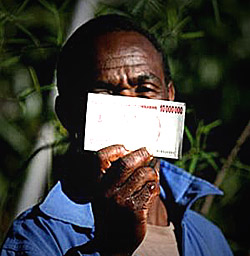 IN THE SAME WEEK THAT NEWSPAPERS announced with blaring headlines that Lehman Brothers, AIG, and Merrill Lynch all should be referred to in the past tense, there was word that the global credit crunch may have taken down another venerable institution: Zimbabwe President-For-Life Robert Mugabe.
IN THE SAME WEEK THAT NEWSPAPERS announced with blaring headlines that Lehman Brothers, AIG, and Merrill Lynch all should be referred to in the past tense, there was word that the global credit crunch may have taken down another venerable institution: Zimbabwe President-For-Life Robert Mugabe.
Yes, at long last, Mugabe has signed a power sharing agreement with his arch nemesis Morgan Tsvangirai which means that on paper at least, the old crocodile of Zimbabwe politics has finally been muzzled.
Yet at first glance, Mugabe's willingness to loosen his iron grip on the throat of his beleaguered nation seems to run counter to everything the man stands for which can be summed as his right to exercise absolute power arbitrarily. After all, it was only in March that Mugabe decided that the fact he lost the presidential election was grounds to declare it fundamentally flawed and to hold what he called a "run off" election at the end of June. The words soon proved prophetic as Mugabe unleashed his goons who tortured and murdered opposition candidates with abandon and cut off food shipments to areas where people had supported the opposition MDC. Mugabe did in fact run off the opposition.
The Zimbabwe Dollar proliferated wildly over the past year before being declared extinct sometime in August. At the time of its demise, the bill featured above was worth about 25 U.S. cents depending on the time of day.
Faced with an untenable situation, the MDC pulled out of the June vote at the last minute leaving Mugabe to crow after his unsurprising victory in a one man race that this just showed how much his downtrodden people loved him.
Even as recently as a few weeks ago, the unrepentant Mugabe issued bellicose statements promising never to share power with anyone.
But it's now clear that Mugabe has come face to face with his most threatening foe ever: hyper inflation. Further, this is one enemy he can't beat with iron bars which has completely flummoxed the old crocodile who has always believed there is no problem that can't be literally whipped.
In August, inflation hit an estimated 20,000,000% annually which just goes to prove what a truly awesome force of nature this economic phenomenon can be if left unchecked. Just about 18 months ago, Zimbabwe's inflation rate was a mere 1,500% per year and the Zimbabwe dollar had at least some value even if it was disappearing by the second.
In a strange way, Mugabe's lassitude in face of inflation and his commitment to running his printing presses at red hot speed may prove to be his most enduring legacy. Certainly, economists for decades to come will owe a debt of gratitude to Mugabe for providing such a magnificent case study in incompetent kleptomania since no one before has ever let run away inflation actually run away like this.
But after years and decades of broken promises by the mercurial African strongman, the U.S. and the E.U. are not only demanding the chance to read the fine print on the power sharing agreement, they want to see it in action.
The Zimbabwe Dollar proliferated wildly over the past year before being declared extinct sometime in August. At the time of its demise, the bill featured above was worth about 25 U.S. cents depending on the time of day.
All of which accounts for the move by the Zimbabwe Central Bank Chief Gideon Gono in early September to declare the U.S. dollar and South African rand to be legal currencies in Zimbabwe.
And as Shakespeare's Hamlet once declared, "Aye, there's the rub" because while it's entirely possible for the Zimbabwe Central Bank to continue to print its version of a nano-currency, Mugabe can't quite get his hands on the U.S. or South African mints.
Which means Mugabe and Lehman Brothers now share one key quality: they are both bankrupt.
With this in mind, Mugabe hasn't signed a power sharing agreement so much as he has orchestrated a partial bail-out of his much disgraced government with the hopes that donor nations, almost exclusively the Western ones he regularly excoriates as throw back imperialists, will open up their purses and pour billions down the Harare rat hole.
 But after years and decades of broken promises by the mercurial African strongman, the U.S. and the E.U. are not only demanding the chance to read the fine print on the power sharing agreement, they want to see it in action. U.S. Ambassador to Zimbabwe James McGee has said he is taking a "very careful wait-and-see" approach to the agreement.
But after years and decades of broken promises by the mercurial African strongman, the U.S. and the E.U. are not only demanding the chance to read the fine print on the power sharing agreement, they want to see it in action. U.S. Ambassador to Zimbabwe James McGee has said he is taking a "very careful wait-and-see" approach to the agreement.
The key is whether Morgan Tsvangirai will really be in charge of day-to-day operations of the government and whether Mugabe will allow him to take control of the country's treasury and now looted central bank. What is also clear is that the West has no intention of giving any aid to Zimbabwe as long as Mugabe's ZANU-PF henchman can get their hot hands on the cold cash.
 Sadly for the people of Zimbabwe, even if the power sharing agreement operates as it is supposed to and the old crocodile is defanged, it will be years before the damage Mugabe has wrought in his own land is overcome.
Sadly for the people of Zimbabwe, even if the power sharing agreement operates as it is supposed to and the old crocodile is defanged, it will be years before the damage Mugabe has wrought in his own land is overcome.
"Getting back to where we were in the 1990s, it would take us another 10 years," the BBC quoted Professor Anthony Hawkins at the University of Harare as saying. "And getting back to the 1980s, it would take us another 15 years."
Since 1981, people have regularly made fools of themselves writing Mugabe's political obituary, but now there seems to be a faint hope that Zimbabwe's long journey out of its nightmare has at last begun.

